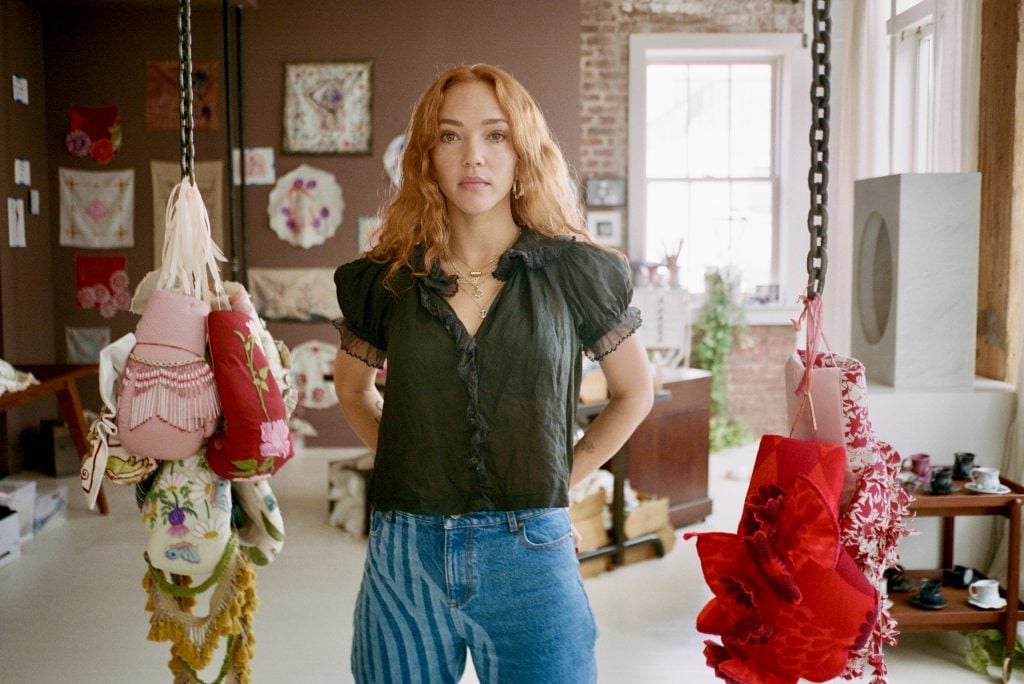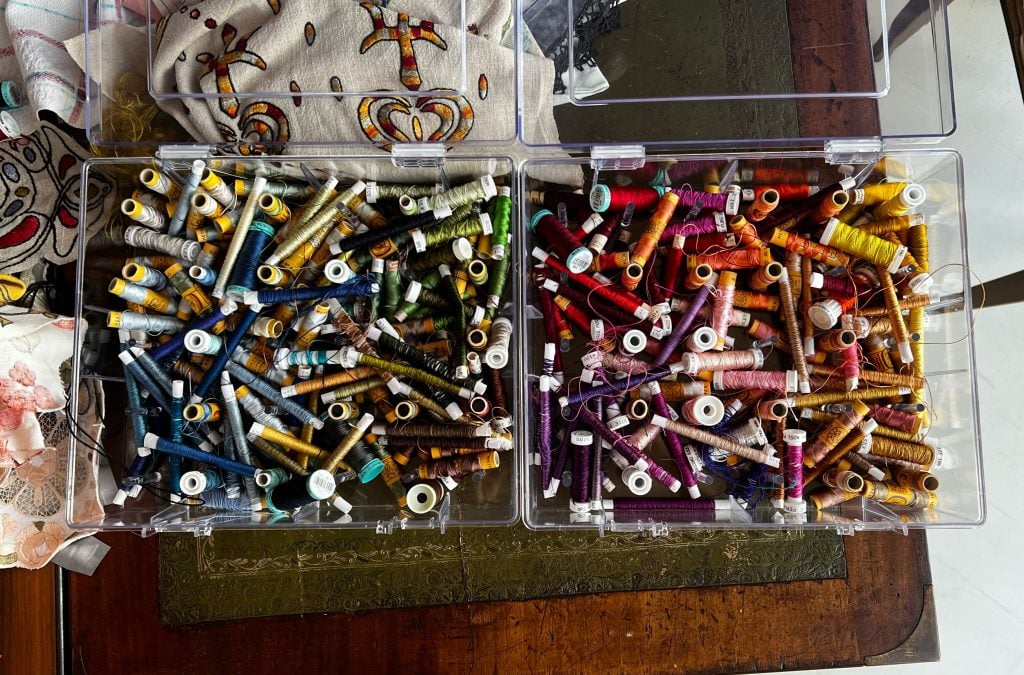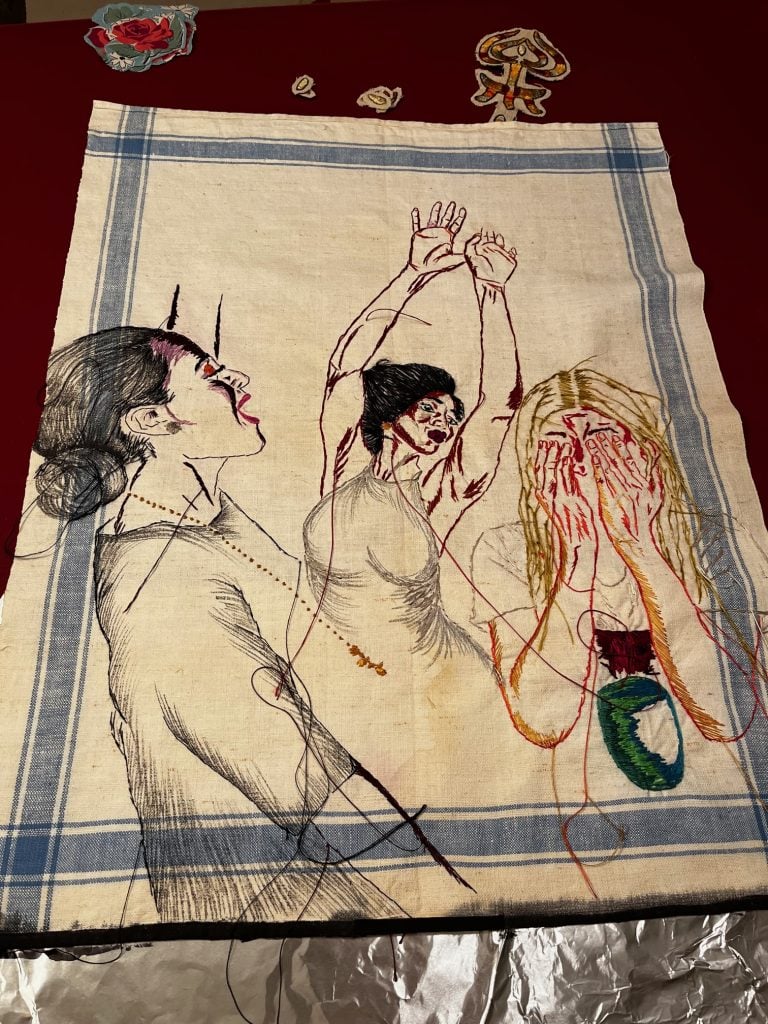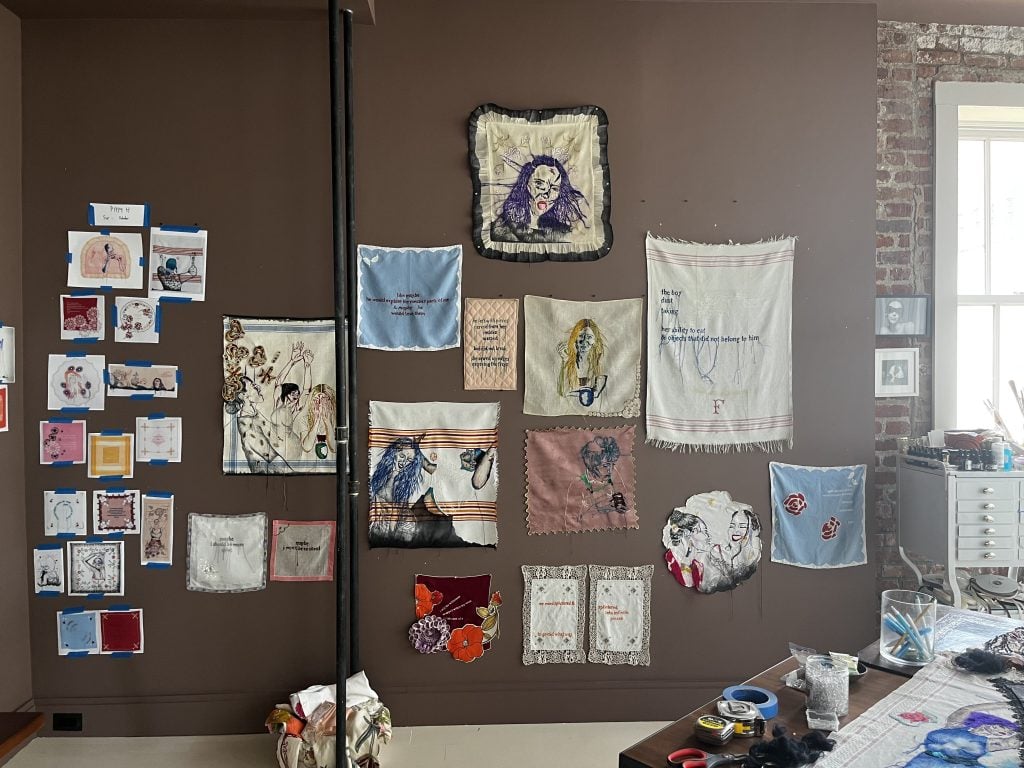Studio Visit
Inside Zoë Buckman’s Studio, Where Vintage Embroidery Thread Is Reborn as Poignant Textile Art
The artist's U.K. solo debut is on view at Pippy Houldsworth through October 1.

The artist's U.K. solo debut is on view at Pippy Houldsworth through October 1.

Naomi Rea

Zoë Buckman is known for her needling work—and that’s not just because her art predominantly involves embroidery. Her subject matter, which explores experiences of gendered violence and trauma, consistently picks at the pervasive social and political environments that enable these harms.
The artist is celebrating her first solo exhibition in the U.K, “Bloodwork,” now on view at Pippy Houldsworth Gallery in London, features a new suite of embroidery on vintage textiles that shine a spotlight on survivors—of domestic abuse, illness, or other personal challenges—many of whom are in her own circle of friends. Buckman’s portraits capture these subjects in moments of jubilation and happiness, daring to embrace joy in the face of disconcerting difficulties.
It’s a big year for Buckman, whose work is also currently on view in a major exhibition at the Parrish Art Museum in Water Mill, curated by artist Hank Willis Thomas and his For Freedoms foundation. Earlier this year, she also exhibited at New York’s Museum of Arts and Design, the Shirley Fiterman Art Center at Borough of Manhattan Community College, and Mother Gallery in Tribeca, as well as the Baltimore Museum of Art.
We caught up with the artist at her home studio in Brooklyn about securing vintage embroidery threads at auction, her distaste for “lazy” art, and the transformative power of giving artwork room to breathe.

Vintage threads in the studio. Image courtesy of Zoë Buckman.
Can you send us a snap of the most indispensable item(s) in your studio and tell us why you can’t live without it?
These are vintage silk threads, most of which I got by bidding in auctions. They’re mainly from Italy and India. Though I could probably find contemporary equivalents, I do need to feel excited about the making process in order to get the results I want, and knowing that these have come from afar in terms of place and time makes me more eager to use them to tell our stories today.
What is a studio task on your agenda this week that you are most looking forward to?
The work for my solo show is complete, and it was really labor intense! I’m looking forward to working with my gallery this week to put together a catalogue for the show—being able to pull back the lens and view the series as a completed whole (as completed as a show ever gets, which is never fully complete but rather a good resting point!). I’m excited.
What kind of atmosphere do you prefer when you work? Do you listen to music or podcasts, or do you prefer silence? Why?
I constantly have music playing in my studio. I work alone and it can be isolating, so having sound around me can breathe life into my mood and into my work. And because music, lyrics and poetry are huge inspirations for my practice itself, it’s helpful to have part of my brain connected to words and meaning.
Who are your favorite artists, curators, or other thinkers to follow on social media right now?
Jasmine Wahi
Rujeko Hockley
Kate Bryan
Talk Art
Toyin Ojih Odutola
Wardell Milan
Vanessa German
Sasha Velour
Is there a picture you can send of your current work in progress at the studio?

Work in progress, kin with it (2022) from my show at Pippy Houldsworth Gallery. Image courtesy of Zoë Buckman.
When you feel stuck while preparing for a show, what do you do to get unstuck?
It’s always best for me to walk away from a piece or idea if it’s not flowing and revisit it the next day. When I’ve completed a work, I usually live with it in my space/in conversation with the rest of the series for some time before I declare it complete and send pics to my gallery. Sometimes on those days I’ll glance at it and something will feel off, usually it’s a feeling that manifests as a bit of sickness in my stomach, like: “That bit there is yuck, I’m gonna change it.” But that feeling can do a total 180 a few days later, so honestly giving one’s work some breathing room is so, so valuable if it’s possible.
What trait do you most admire in a work of art? What trait do you most despise?
I’m drawn to art that draws you in and holds you while it delivers a powerful message. I’m drawn to art that is well made, and has something to say.
I don’t like art that is basic or lazy; that’s not to say that I despise simplicity. There is often such power to the stripped back, raw and simple. But lazy art I have no time for.
What images or objects do you look at while you work? Share your view from behind the canvas or your desktop—wherever you spend the most time.
I live with books of artists I admire around me. They are part of the fabric of my studio and I’ll often rest a cup of tea on an art book—something I don’t consider to be a disrespect. I hope people live with my book when I have one. I hope the pages get crumpled from use and they spill on it because it was used to support their morning coffee or evening cocktail.

View of my studio. Image courtesy of Zoë Buckman.
What is the last exhibition you saw that made an impression on you and why?
Wardell Milan’s solo show at the Bronx Museum curated by Jasmine Wahi was devastating and stunning. Faith Ringgold at the New Museum was iconic.
What made you choose this particular studio over others?
I had no choice: my studio is my living room!
Describe the space in three adjectives.
Mine. Finally. Mine.
How does the studio environment influence the way you work?
I’m not by any stretch of the imagination a neat freak, but I can’t have too much clutter and hazarai around me as it makes me feel tetchy. So, I’ll often do a quick clean up in the morning, light some incense, chant some mantras, blare some tunes and get to work.
“Zoë Buckman: Bloodwork” is on view at Pippy Houldsworth Gallery, 6 Heddon Street, London, September 2–October 1, 2022.